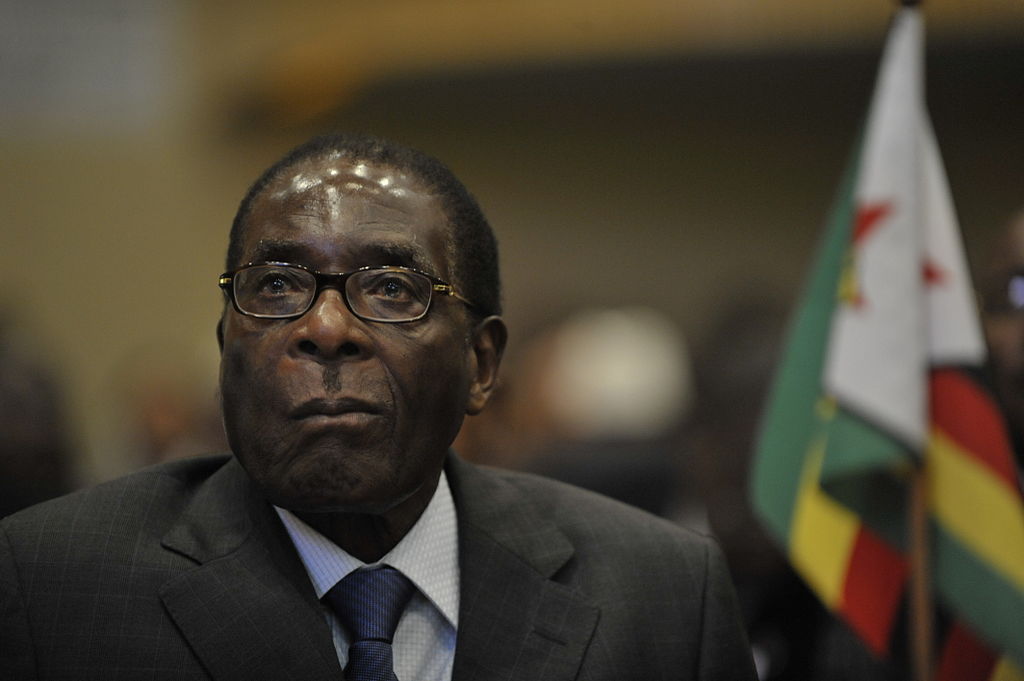The great leader has fallen. Tanks swept through the streets of the capital. A cadre of army officers seized the elderly statesman and demanded that he publicly resign and hand over power to their chosen successor. A corrupt administration happily turns, as does his public support. His family have fled the country. Senior members of his government are either already under house arrest or are fleeing.
The resignation of Zimbabwean President Robert Mugabe following what has been, if not in name than in action, a military coup, ends the reign of one of the world’s few remaining Cold War dictatorships. When in 1980 Mugabe, then head of the socialist Zimbabwe African National Union (ZANU), became the new state of Zimbabwe’s first Prime Minister, one of his first actions was to thank the only country eager to supported his cause. The Peoples Republic of China was the first non-African country to recognise the founding of Zimbabwe, and the first to recognise his very personal style of government.

Today, China influence over the former British colony has only increased. China is Zimbabwe’s largest trading partners, buying the majority of the country’s most valuable export — the legal but addictive drug, tobacco. It also has its eyes on the country’s platinum reserves.
In return China sells Zimbabwe military hardware, despite multiple sanctions being in place. Indeed, there are even speculative reports that the Chinese government knew of, if not orchestrated, the plot — army officers behind the coup were recently guests of Beijing — though as yet no actual evidence to support this theory has been presented, nor is there a clear motive.
Personally I doubt there will be many more footsteps hurrying between the corridors of power in Beijing. Despite Zimbabwe’s consistent political support, China has far more significant interests than this relic of a state, caught perpetually in the politics of hate kept alive by anti-colonial rhetoric.
The last great round of regime change, the Arab Spring, was a more dramatic expression of populism that toppled more powerful regimes, even if it’s lingering summer in Syria has proven a disappointment. However, there will a few heads on the Politburo that will be feeling the hairs on their necks at the current news. This is because Mugabe’s story and the ideology of his regime are unnervingly familiar. And uneasy rests the head that wears this crown.
An anti-colonial revolutionary and African nationalist, Mugabe kept alive the romantic ideal of a pan-African civilisation. Colonialism had not given rise to a national sentiment, but had humiliated and plundered a once proud civilisation. “Africa must revert to what it was before the imperialists divided it,” he declared in 1962. It was a message that chimed with the times.
On being made Prime Minister, Mugabe famously pleaded to Zimbabwe’s white settler population to “remain in this country and constitute a nation based on national unity.” Despite a socialist agenda, farms would not be nationalised and private property respected. His was meant to be the first rainbow nation — though as a devout Catholic, despite his less than saintly personal and familial affairs, I am sure he would not have used the term.
As the realities of governance and administration began to bear heavily, his Zimbabwe African National Union (ZANU) adopted a new position, and are renamed ZANU-PF, or Patriotic Front. Demands for free elections result in opposition parties being declared illegal and their leaders threatened with imprisonment under the guise of preserving law and order. Education is strictly controlled, and universities turned over to the promotion of non-political studies under the supervision of party officials. Universal suffrage is celebrated as ballots are controlled. For all this, a younger generation of Zimbabweans are told they must be grateful — to their elders for the past hardships they endured; to the “veterans” and other armed men for carrying out the struggle against as colonial oppression; and for the great leader without whom they would not be free.
So as the television cameras rolled, and we watched an old man, flanked on either side by army officers, stumble his way through a prepared script all the while attempting to maintain the facade that all was as it should be, I could not help but feel for those leaders of other authoritarian regimes for whom the sword of Damocles still hangs. It might hang less precariously, prompt up by the promises of an economy and a police state with unparalleled powers of surveillance and execution, but the blade remains as sharp.
Watching as a people, once oppressed into apathy, take to the streets in celebration after their military — and no longer that merely of their leaders — topple a man whose cult of personality within his own country had once given him the veneer of the divine. Mugabe’s thoughts were once lauded as party dogma. Today we are reminded that nothing is ever truly dogma, as it is only through repeatedly standing up to criticism does any idea carry value; and that adherence to rules and love of a party is only achieved with consent. How this story will end is still far from certain. But as with the results of the Arab Spring, this is not to fault those who stand up to power, but that of a system that does not allow for popular change.
It is why the advancement of democracy has prevailed, and the democratic ideal — if not any one particular system — does still represent the end of history. It is not in politics but in our relationship with power itself that this must represent the ideal: for all power, fundamentally, rests with the people. The triumph of the democratic system is not in bestowing of authority, but in its transition. Authoritarianism by contrast relies on the successful exercise of power for its legitimacy. And all good runs will come to an end.
